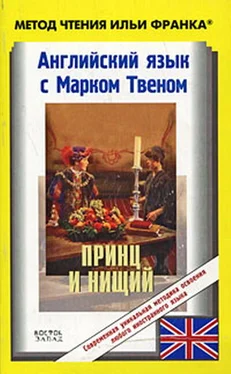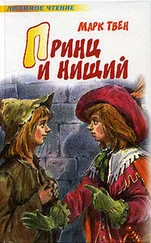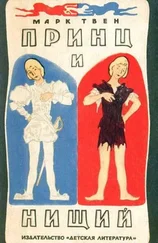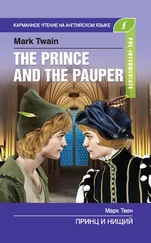Wrapped in prison blankets (закутанные в тюремные одеяла) of a soiled and tattered condition (грязного и потрепанного состояния), Hendon and the king passed a troubled night (Хендон и король провели тревожную ночь). For a bribe the jailer had furnished liquor (за взятку тюремщик поставлял спиртные напитки) to some of the prisoners (некоторым из заключенных); singing of ribald songs (пение непристойных песен), fighting, shouting, and carousing (драки, крики и кутеж), was the natural consequence (было естественным следствием). At last (наконец), awhile after midnight (через некоторое время после полуночи), a man attacked a woman (один мужчина напал на женщину) and nearly killed her (и почти убил ее) by beating her over the head (избивая ее по голове) with his manacles (своими наручниками) before the jailer could come to the rescue (прежде чем тюремщик смог прийти на помощь). The jailer restored peace (тюремщик восстановил мир) by giving the man a sound clubbing (тем, что дал мужчине основательное избиение дубинкой = основательно поколотил) about the head and shoulders (по голове и плечам) — then the carousing ceased (тогда кутеж прекратился); and after that (а после этого), all had an opportunity to sleep (все получили возможность поспать) who did not mind the annoyance (кто не обращал внимания на раздражение = шум) of the moanings and groanings of the two wounded people (стонов и оханий двух раненых людей).
During the ensuing week (в течение последовавшей недели), the days and nights were of a monotonous sameness (дни и ночи были = отличались монотонной одинаковостью), as to events (что до событий); men whose faces Hendon remembered more or less distinctly (люди, чьи лица Хендон запомнил более или менее четко) came, by day, to gaze (поглазеть) at the 'impostor' (приходили днем поглазеть на «самозванца») and repudiate and insult him (и отречься /отказаться признать/ и оскорбить его); and by night the carousing and brawling went on (а ночью кутежи и скандалы продолжались; to go on — продолжаться: «идти дальше»), with symmetrical regularity (с симметричной = такой же регулярностью). However, there was a change of incident at last (однако, произошла перемена наконец). The jailer brought in an old man, and said to him (тюремщик привел внутрь старика и сказал ему; to bring — приносить, приводить):
'The villain is in this room (этот негодяй — в этой комнате) — cast thy old eyes about (взгляни вокруг; to cast — бросать; eyes — глаза) and see if thou canst say (и посмотри, можешь ли ты сказать) which is he (который он).'
thoroughly [`θArəlı], examine [ıg`zæmın], monotonous [mə`nOtənəs]
THE cells were all crowded; so the two friends were chained in a large room where persons charged with trifling offenses were commonly kept. They had company, for there were some twenty manacled or fettered prisoners here, of both sexes and of varying ages — an obscene and noisy gang. The king chafed bitterly over the stupendous indignity thus put upon his royalty, but Hendon was moody and taciturn. He was pretty thoroughly bewildered. He had come home, a jubilant prodigal, expecting to find everybody wild with joy over his return; and instead had got the cold shoulder and a jail. The promise and the fulfilment differed so widely, that the effect was stunning; he could not decide whether it was most tragic or most grotesque. He felt much as a man might who had danced blithely out to enjoy a rainbow, and got struck by lightning.
But gradually his confused and tormenting thoughts settled down into some sort of order, and then his mind centered itself upon Edith. He turned her conduct over, and examined it in all lights, but he could not make anything satisfactory out of it. Did she know him? — or didn't she know him? It was a perplexing puzzle, and occupied him a long time; but he ended, finally, with the conviction that she did know him, and had repudiated him for interested reasons. He wanted to load her name with curses now; but this name had so long been sacred to him that he found he could not bring his tongue to profane it.
Wrapped in prison blankets of a soiled and tattered condition, Hendon and the king passed a troubled night. For a bribe the jailer had furnished liquor to some of the prisoners; singing of ribald songs, fighting, shouting, and carousing, was the natural consequence. At last, awhile after midnight, a man attacked a woman and nearly killed her by beating her over the head with his manacles before the jailer could come to the rescue. The jailer restored peace by giving the man a sound clubbing about the head and shoulders — then the carousing ceased; and after that, all had an opportunity to sleep who did not mind the annoyance of the moanings and groanings of the two wounded people.
During the ensuing week, the days and nights were of a monotonous sameness, as to events; men whose faces Hendon remembered more or less distinctly came, by day, to gaze at the 'impostor' and repudiate and insult him; and by night the carousing and brawling went on, with symmetrical regularity. However, there was a change of incident at last. The jailer brought in an old man, and said to him:
'The villain is in this room — cast thy old eyes about and see if thou canst say which is he.'
Hendon glanced up (Хендон взглянул вверх = поднял глаза), and experienced a pleasant sensation (и испытал приятное ощущение) for the first time since he had been in the jail (в первый раз с тех пор как он был в тюрьме). He said to himself (он сказал себе), 'This is Blake Andrews (это Блейк Эндрюс), a servant all his life in my father's family (слуга всю свою жизнь в семье моего отца) — a good honest soul (добрая, честная душа), with a right heart in his breast (с прямым сердцем в груди). That is, formerly (то есть — раньше). But none are true now (но никто не верен сейчас); all are liars (все лгуны). This man will know me (этот человек узнает меня) — and will deny me, too (и оттолкнет меня тоже), like the rest (как остальные).'
The old man gazed around the room (старик оглядел комнату; to gaze — глядеть, глазеть; around — вокруг), glanced at each face in turn (взглянул на каждое лицо по очереди), and finally said (и наконец сказал):
'I see none here but paltry knaves (я не вижу никого здесь кроме презренных жуликов), scum o' the streets (отбросы улиц; o’ = of). Which is he (который он)?'
Читать дальше
Конец ознакомительного отрывка
Купить книгу




![Марк Твен - Принц и нищий [Издание 1941 г.]](/books/148799/mark-tven-princ-i-nichij-izdanie-1941-g-thumb.webp)







